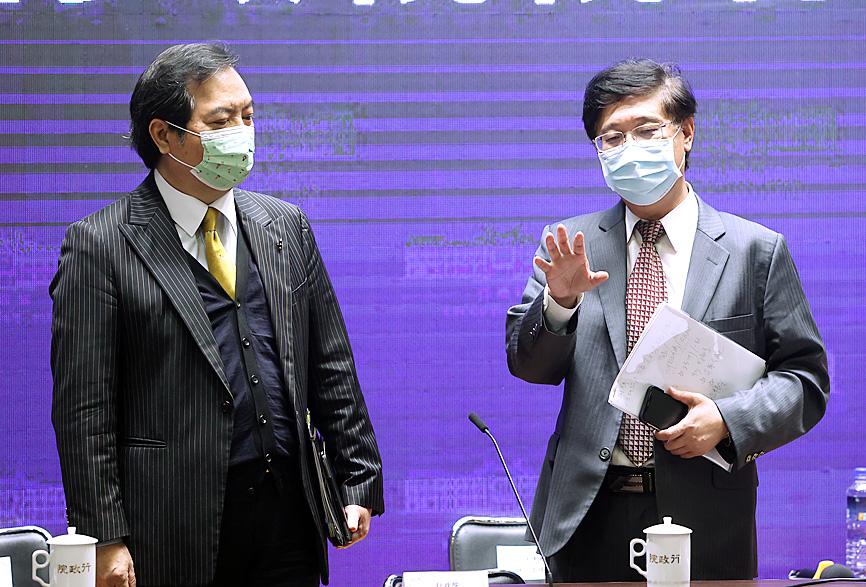The Executive Yuan yesterday approved draft bills to pave the way for the establishment of a ministry of digital development, which would be tasked with boosting cybersecurity and accelerating the nation’s digital transformation.
The bills include amendments to the Organizational Act of the Executive Yuan (行政院組織法) and proposed laws on the establishment of the ministry and its affiliates, which are to be forwarded for legislative review.
The proposed ministry would focus on telecommunications, information technology, cybersecurity, the Internet and media communications, Executive Yuan spokesman Lo Ping-cheng (羅秉成) quoted Premier Su Tseng-chang (蘇貞昌) as saying at a regular Cabinet meeting yesterday morning.

Photo: CNA
Minister Without Portfolio Kuo Yau-hwang (郭耀煌), who oversees technological policy, has been tapped as the convener of the ministry’s preparatory office, Lo said.
The creation of a digital development ministry was part of President Tsai Ing-wen’s (蔡英文) campaign promise and a policy that is favored by the nation’s entrepreneurs.
Kuo said the Executive Yuan expects the office to complete the preparatory work in six to 12 months, allowing the ministry to start operating in the first quarter of next year at the earliest.
The ministry would focus on the development of the software and digital service industries, upgrading small and medium-sized enterprises, and traditional industries, and creating a globally competitive and innovative base in digital technologies, he said.
A cybersecurity bureau and national cybersecurity research institute are to be established under the ministry’s aegis, he said.
The ministry would also be tasked with overseeing interdepartmental coordination on cybersecurity and efforts to foster a domestic cybersecurity technology sector, he said.
The Executive Yuan also approved amendments to redesignate the Ministry of Science and Technology into the National Science and Technology Council.

POSITIVE DEVELOPMENT: Japan and the US are expected to hold in-depth discussions on Taiwan-related issues during the meeting next month, Japanese sources said The holding of a Japan-US leaders’ meeting ahead of US President Donald Trump’s visit to China is positive news for Taiwan, former Japan-Taiwan Exchange Association representative Hiroyasu Izumi said yesterday. After the Liberal Democratic Party’s landslide victory in Japan’s House of Representatives election, Japanese Prime Minister Sanae Takaichi is scheduled to visit the US next month, where she is to meet with Trump ahead of the US president’s planned visit to China from March 31 to April 2 for a meeting with Chinese President Xi Jinping (習近平). Japan and the US are expected to hold in-depth discussions on Taiwan-related issues during the

‘LIKE-MINDED PARTNER’: Tako van Popta said it would be inappropriate to delay signing the deal with Taiwan because of China, adding he would promote the issue Canadian senators have stressed Taiwan’s importance for international trade and expressed enthusiasm for ensuring the Taiwan-Canada trade cooperation framework agreement is implemented this year. Representative to Canada Harry Tseng (曾厚仁) in an interview with the Central News Agency (CNA) said he was increasingly uneasy about Ottawa’s delays in signing the agreement, especially as Ottawa has warmed toward Beijing. There are “no negotiations left. Not only [is it] initialed, we have three versions of the text ready: English, French and Mandarin,” Tseng said. “That tells you how close we are to the final signature.” Tseng said that he hoped Canadian Prime Minister Mark Carney

President William Lai (賴清德) yesterday bestowed one of Taiwan’s highest honors on Saint Vincent and the Grenadines (SVG) Ambassador Andrea Clare Bowman in recognition of her contributions to bilateral ties. “By conferring the Order of Brilliant Star with Grand Cordon on Ambassador Bowman today, I want to sincerely thank her, on behalf of the Taiwanese people, for her outstanding contribution to deepening diplomatic ties between Taiwan and SVG,” Lai said at a ceremony held at the Presidential Office in Taipei. He noted that Bowman became SVG’s first ambassador to Taiwan in 2019 and

A man walks past elementary school artworks at the Taipei Lantern Festival in Ximen District yesterday, the first day of the event. The festival is to run from 5pm to 10pm through March 15.